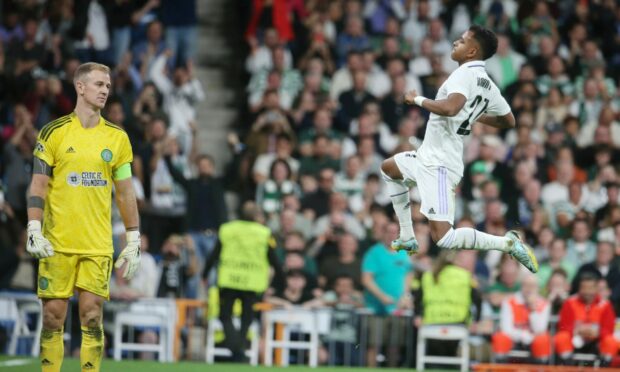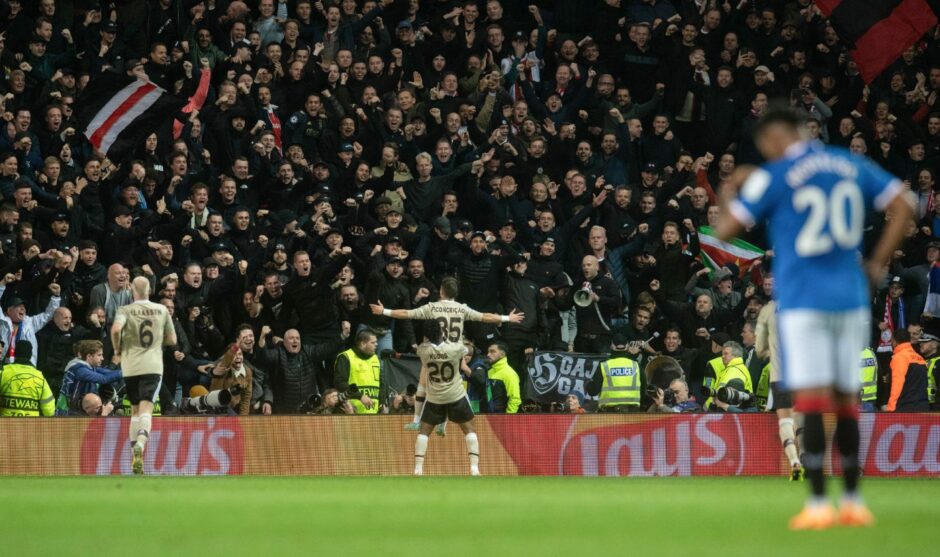Scottish football was put out of its Champions League misery in midweek as the campaign from hell came to a predictable end with two more depressing results.
Of the top ten home, and top ten away, defeats Celtic and Rangers have suffered in the group stages of the competition, six of them have occurred this season.
Two of Rangers’ Ibrox appearances make the list, as does Celtic’s home reversal to Real Madrid. Ange Postecoglou’s team’s visit to the Bernabau also figures, while Rangers trips to Amsterdam and Naples produced two of their heaviest losses.
Those statistics are frightening enough, but there’s more.
Celtic have now racked up 7-0, 7-1, 6-1 and 5-1 hammerings away from home in the group stages, and over their 11 campaigns have achieved just two victories out of 33. They have lost 27.
Their away form has historically been awful, but for most of their earlier Champions League seasons, Celtic could at least rely on giving the biggest teams a real scare at Parkhead. No longer. They haven’t won in ten games, and have now completed three straight forays without a victory.
Celtic at least put in a decent effort in Group F, they had plenty shots on target, and had they been more clinical, they would certainly have scooped up a few more points.
But Postecoglou’s approach is football suicide. He simply doesn’t have the quality right now to play that way. If Celtic fans are happy to see some attractive football, but consistently lose heavily, then he will be under no real pressure.
However, you have to wonder how long the patience will last.
Celtic finished 30th of the 32 teams in the group stages, overshadowed by their city rivals, who not only ended bottom of the pile – below Plzen, who also lost all six games – but managed to become the worst side ever to compete at that level.
Their final tally of two goals scored, one of which was a penalty, and 22 conceded, was nothing short of embarrassing.
The anticipation felt by their fans after qualifying with wins over Union and PSV Eindhoven dissipated somewhat when the draw landed them in an admittedly difficult group, then quickly turned to horror and despair, when it soon became clear they were out of their depth.
Giovanni van Bronckhorst does not have the same credit in the bank Ange Postecoglou has, and he will be delighted the European campaign is over.
He now has to hope that his side can put together successive victories in their pre-World Cup encounters with St Johnstone, Hearts and St Mirren, and at least keep up a modicum of pressure on Celtic.
The good news for him is that while Rangers couldn’t cope with the Champions League, they are still, generally, too good for domestic opposition, as we saw last weekend against Aberdeen.
Having headed for Ibrox full of confidence, it is fair to say the Dons took a pretty serious beating.
The Dutchman needs similar performances in the next three games if he is to keep alive his hopes of wrestling the title back from Celtic.
If he doesn’t get that, there might be a big decision ahead for the Ibrox board.
Auld Enemy clash brings memories flooding back
The news that Scotland and England are to renew rivalries next year, as a celebration of the 150th anniversary of their first showdown, will have been welcomed by the Tartan Army.
As a young football fan, it was a fixture that utterly captivated me.
Back then, other than the European Cup final, it was pretty much the only game shown live each year on television, and I would be glued to the screen.
The first time I saw Scotland win the game, in the Home International Championship ahead of the 1974 World Cup finals, it was a source of the deepest joy imaginable, diminished only partly by the 5-1 thrashing we suffered at Wembley 12 months later.
I have attended nine of the meetings over the years, and witnessed us win just once. Even that was bittersweet, the 1-0 in London in 1999 too little, too late, after losing the first leg of the Euro 2000 play-off at Hampden.
Hopefully 2023 will serve up something memorable.


Conversation